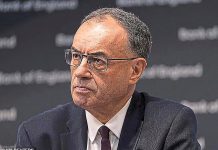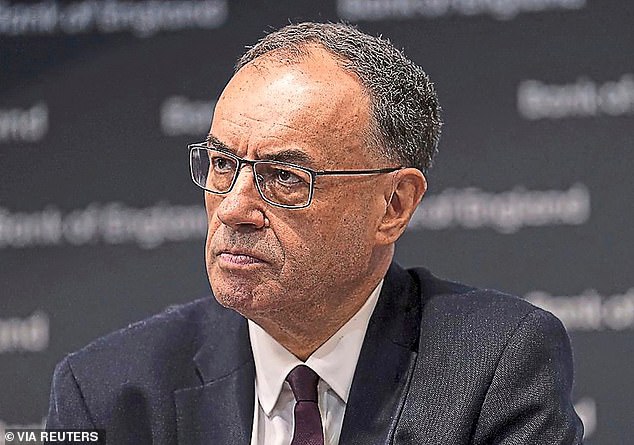Borrowing costs spiked higher last night after the Bank of England Governor warned it was far from certain when interest rates would next be cut.
With inflation in the UK the highest in the G7 – and nearly twice the 2 per cent target – the central bank yesterday held rates at 4 per cent.
It also scaled back its so-called quantitative tightening (QT) bond-sale programme from £100billion a year to £70billion, in a move many hoped would soothe concerns on the bond markets.
But in another blow to Chancellor Rachel Reeves ahead of the November Budget, the cost of Government borrowing jumped again, with the yield on 30-year gilts surging above 5.5 per cent.
The spike came as Governor Andrew Bailey appeared to play down the prospect of further interest rate cuts any time soon.
‘I continue to think that there will be some further reductions, but I think the timing and scale of those is more uncertain now,’ he said.

On hold: Bank of England governor Andrew Bailey (pictured) appeared to play down the prospect of further interest rate cuts any time soon
According to bets on financial markets, there is just a 30 per cent chance of another rate cut this year, with the next move seen as coming in the spring of next year.
There is then only a 55 per cent chance of another cut before the end of 2026. But analysts at fund manager Schroders suggested the next move in rates may in fact be up as the Bank grapples with high inflation.
‘We continue to expect rates to remain on hold this year and next, but can’t rule out the possibility that the Bank’s next move will be up, rather than down,’ said George Brown, its senior economist.
The rise in bond yields is a setback for the Chancellor because it pushes up the cost of borrowing ahead of a Budget where she is struggling to make her numbers add up.
It is feared she is facing a black hole in finances of as much as £50billion – sparking speculation of another round of tax rises.
It was hoped that by scaling back its bond-selling, the Bank would help bring yields down by reducing the supply of gilts – Government IOUs – therefore making them more valuable.
Critics argue the Bank’s unique QT programme has fuelled a jump in Government borrowing costs, which recently hit a 27-year-high, and left taxpayers on the hook for an annual bill of £20billion.
By adding to the cost of servicing the national debt and creating huge losses for the Bank, which the Treasury has to cover, QT has eaten into the money available to spend elsewhere.
Reeves relies on borrowing from investors to help fill the gap between what the Government spends on public services and raises in tax, as growth stalls.
After the 2008 financial crisis and during the pandemic the Bank bought £895billion of gilts to help keep the economy afloat.
It bought this debt at very high prices from commercial banks when interest rates were almost zero.
Bond prices go up when rates go down, and vice versa. But since 2022 the Bank – alone among central banks – has been selling some of this debt on the open market at a big loss to the taxpayer after interest rates shot up, to combat inflation.
The Bank yesterday announced plans to slow this process.
‘The Bank was right to slow the unwinding of its economic support programme. It has added unnecessary pressure on gilt yields at a time of global pressures,’ said Carsten Jung of the influential Institute for Public Policy Research and a former Bank of England economist.
But he said the Bank, which still holds £558billion of bonds, ‘should have gone further and fully stopped active gilt sales…as these are not needed for its monetary policy strategy’.
DIY INVESTING PLATFORMS

AJ Bell

AJ Bell
Easy investing and ready-made portfolios

Hargreaves Lansdown

Hargreaves Lansdown
Free fund dealing and investment ideas

interactive investor

interactive investor
Flat-fee investing from £4.99 per month

InvestEngine

InvestEngine
Account and trading fee-free ETF investing
Trading 212
Trading 212
Free share dealing and no account fee
Affiliate links: If you take out a product This is Money may earn a commission. These deals are chosen by our editorial team, as we think they are worth highlighting. This does not affect our editorial independence.
Compare the best investing account for you
#Bond #yields #rise #Bank #dents #hopes #rate #cuts #analyst #move
















